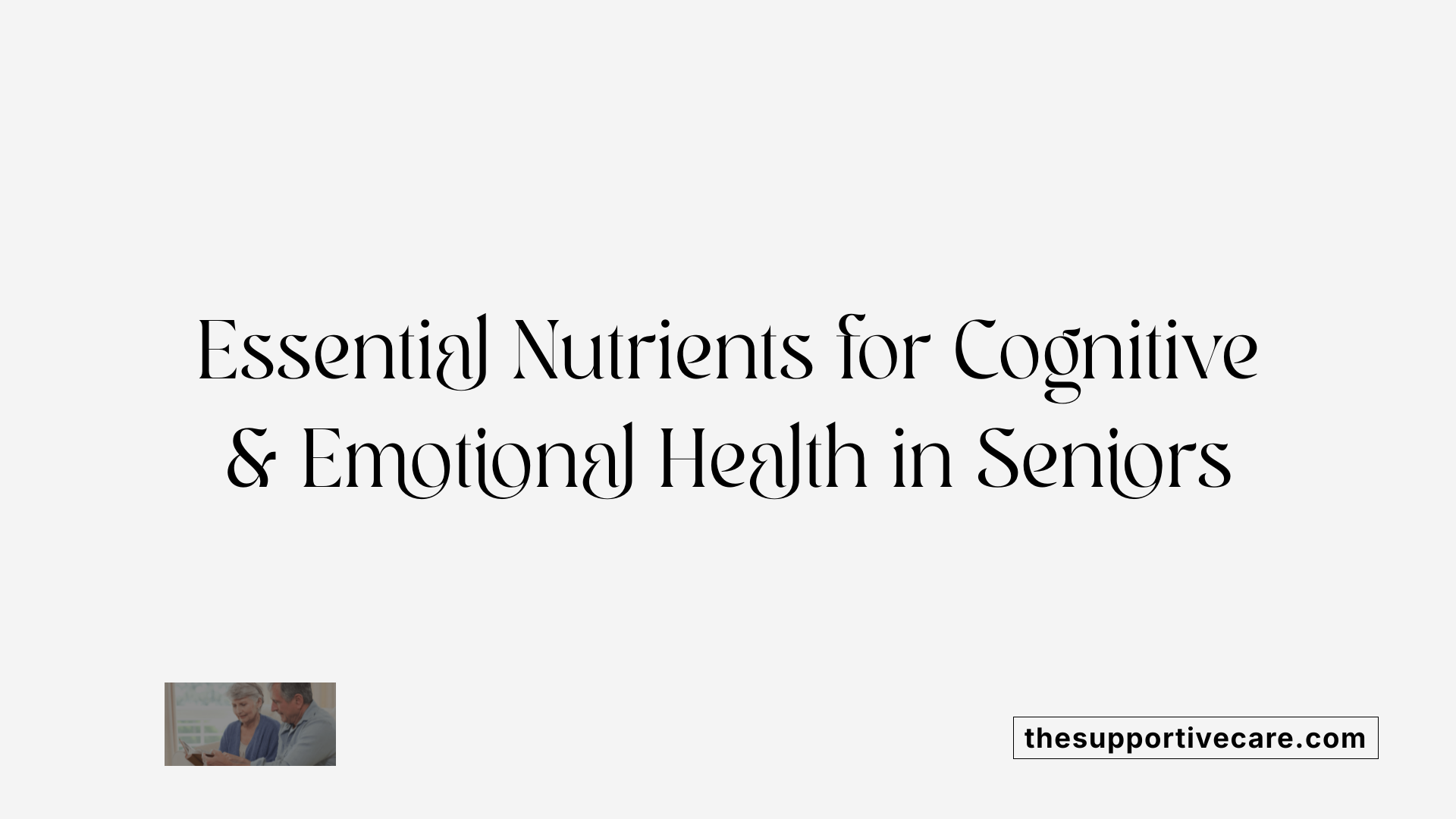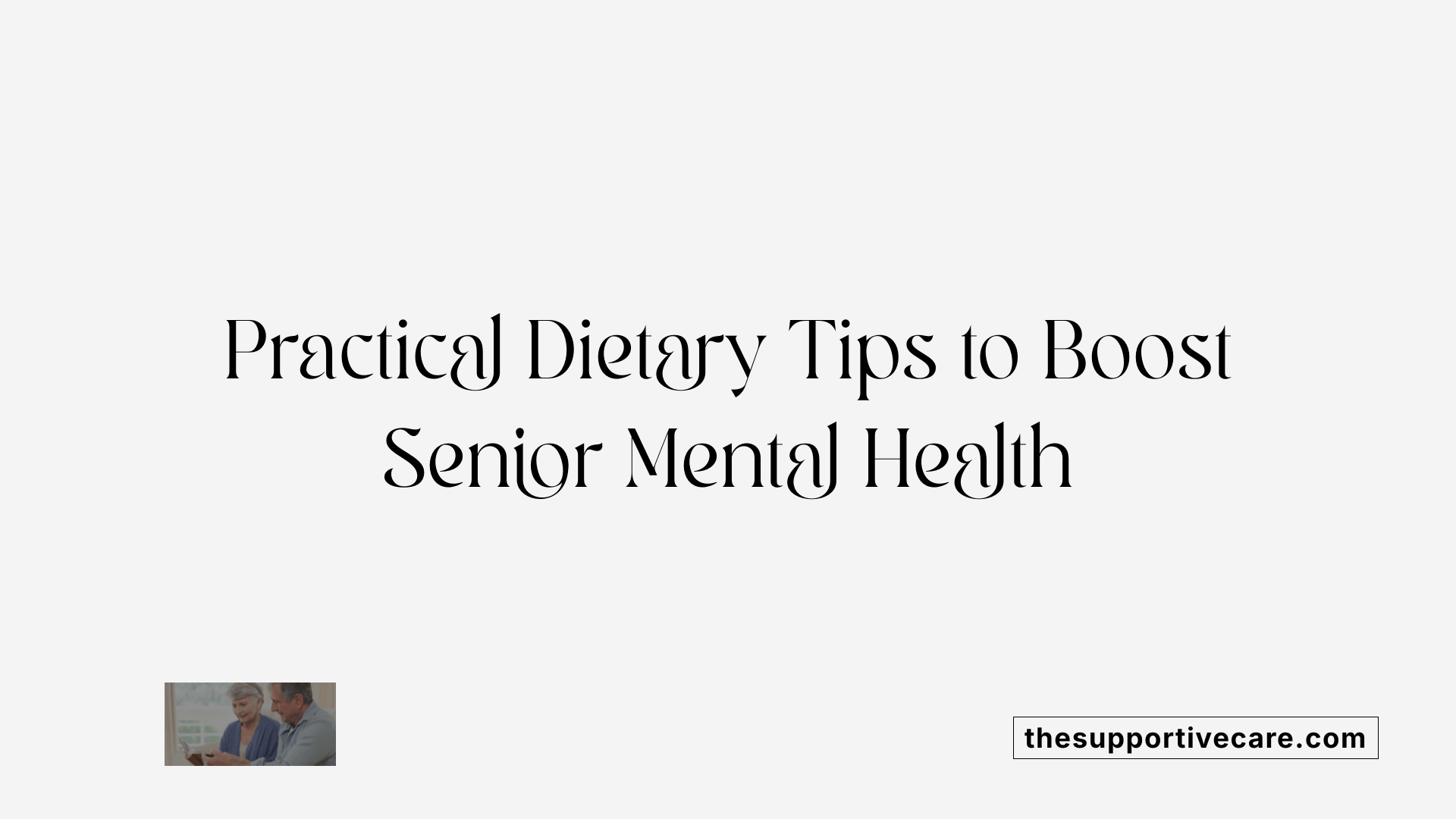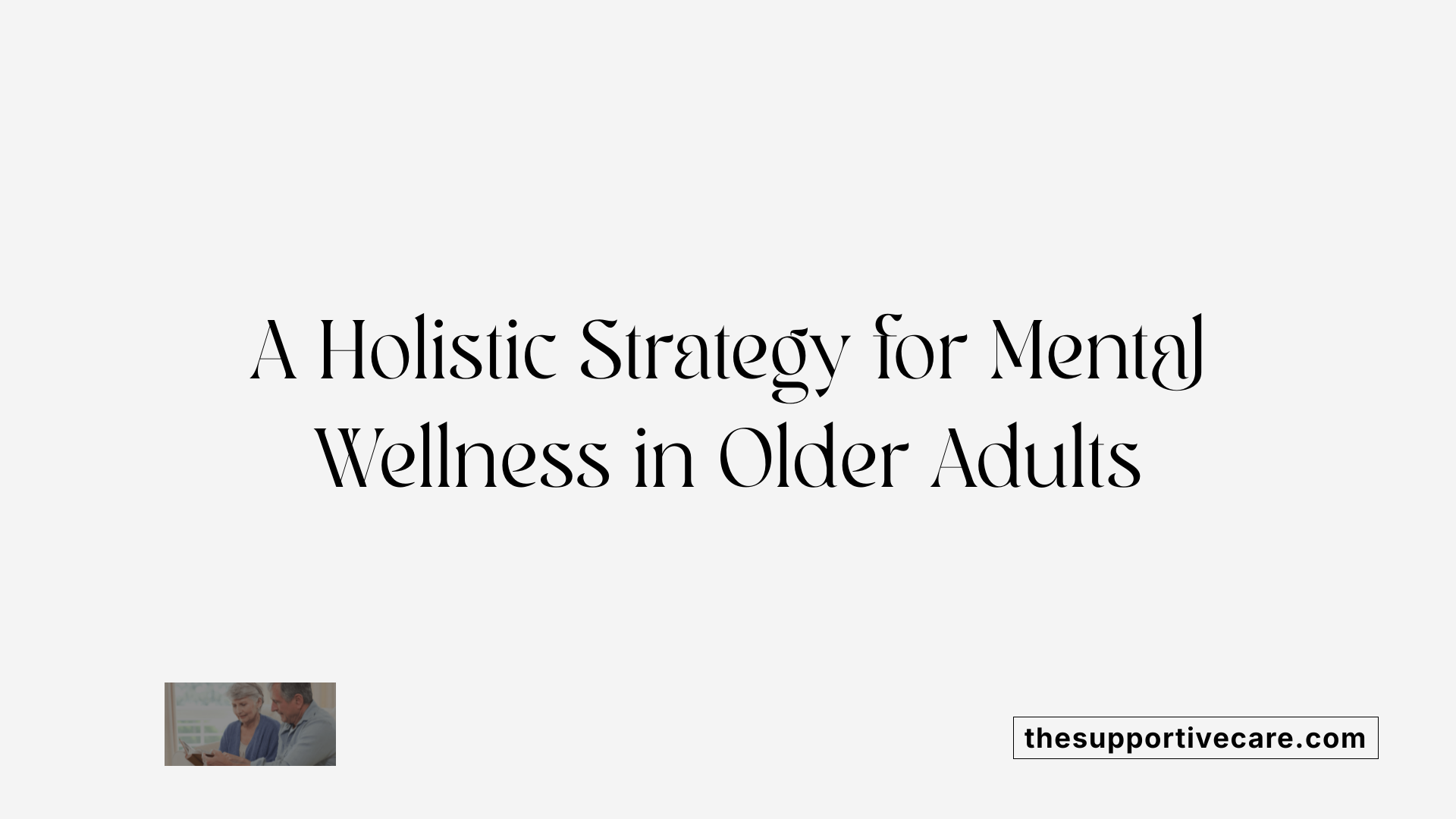The Essential Connection Between Diet, Mental Health, and Aging
As individuals age, maintaining mental health becomes as vital as preserving physical vitality. An emerging body of scientific evidence underscores the significant influence of nutrition and lifestyle factors on mental well-being in older adults. From nourishing the brain with essential nutrients to fostering social connections and regular physical activity, comprehensive strategies are necessary to support mental resilience and emotional stability in seniors. This article explores how dietary patterns, specific nutrients, and lifestyle habits intertwine to promote mental health, delay cognitive decline, and enhance the overall quality of life during aging.
Dietary Patterns and Mental Health in Aging Populations

How does diet impact mental and emotional well-being in older adults?
Diet plays a vital role in shaping the mental and emotional health of older adults. Adhering to healthy dietary patterns, especially the Mediterranean diet, has been linked to significant reductions in anxiety, depression, and perceived stress while enhancing sleep quality. The Mediterranean diet emphasizes foods rich in omega-3 fatty acids, polyphenols, fiber, B vitamins, and antioxidants, all of which contribute to brain health and mood regulation.
Nutrients like omega-3s support the structure and function of brain cells, reduce inflammation, and influence neurotrophic factors such as BDNF, which are crucial for mental resilience. B vitamins, including B12 and folate, are essential for neurotransmitter synthesis, impacting mood and emotional well-being. Moreover, a diet rich in colorful fruits and vegetables promotes antioxidant intake, defending brain tissues from oxidative stress.
Conversely, diets high in processed foods, saturated fats, and added sugars can lead to increased inflammation and neuroinflammation, which negatively affect emotional health and cognitive function. Processed foods are also addictive and can stimulate brain pleasure centers, leading to cravings for unhealthy options that further impair mental health.
In summary, a balanced, nutrient-rich diet supports mental clarity, emotional stability, and resilience against mood disorders. Integrating such dietary patterns with other lifestyle factors like regular physical activity and social engagement offers a holistic approach to maintaining mental wellness in older age.
What scientific evidence supports the connection between nutrition and mental health in aging populations?
Research robustly supports the link between diet and mental health among older adults. Epidemiological studies reveal that following diets such as the Mediterranean and MIND diets is associated with a lower incidence of depression, cognitive decline, and neurodegenerative illnesses, including Alzheimer’s disease.
Clinical trials highlight that nutrients like omega-3 fatty acids (EPA and DHA), B vitamins (especially B6, B12, and folate), antioxidants such as vitamins C and E, and complex carbohydrates can modulate inflammation, promote neurotransmitter production, and support neuroplasticity. For example, omega-3s support brain cell membrane integrity and have anti-inflammatory effects, reducing symptoms of depression and anxiety.
Further evidence shows that nutritional interventions combined with physical activity, such as resistance training, can improve psychological parameters like anxiety, depression, perceived stress, and sleep quality. These improvements are mediated by mechanisms including regulation of the autonomic nervous system, reduction of cortisol, and anti-inflammatory actions.
Studies utilizing validated scales—including the Hospital Anxiety and Depression Scale (HADS), Pittsburgh Sleep Quality Index (PSQI), and Perceived Stress Scale (PSS)—confirm that optimal nutrition correlates with better mental health outcomes.
In conclusion, a nutrient-dense diet, rich in specific micro- and macronutrients, provides a non-invasive, accessible means to support mental health, cognitive function, and emotional stability in aging populations. This growing body of evidence underscores the importance of dietary quality for healthy aging.
Exploring Dietary Patterns and Their Effects
| Diet Type | Main Components | Impact on Mental Health | Supporting Evidence |
|---|---|---|---|
| Mediterranean Diet | Fruits, vegetables, lean proteins, whole grains, olive oil, nuts | Reduces depression, cognitive decline, stress | Multiple epidemiological and intervention studies |
| MIND Diet | Combines Mediterranean and DASH diets; emphasizes berries, greens, nuts, fish | Associated with fewer depressive and cognitive issues | Studies show links to lower Alzheimer’s risk |
| Traditional Diets | Varies globally; often emphasizes minimally processed, whole foods | Support brain health and longevity | Historical and current research support |
| Processed Foods | High in saturated fats, sugars, additives | Increase inflammation, mood disturbances, cognitive decline | Evidence of negative effects on mental health |
Factors Influencing Diet and Mental Wellness
| Factors | Effect on Diet and Mental Health | Examples |
|---|---|---|
| Nutrient Intake | Essential for neurotransmitter synthesis, inflammation control | Omega-3s, B vitamins, antioxidants |
| Gut Microbiota | Influences mood via the gut-brain axis | Fiber-rich foods, fermented foods |
| Lifestyle Choices | Exercise, social support, sleep influence dietary impact on mental health | Physical activity, social engagement, sleep hygiene |
| Processing and Additives | Ultra-processed foods impair brain function | Sugary snacks, fast foods |
Adopting dietary patterns that emphasize whole, unprocessed foods while maintaining other healthy lifestyle factors can significantly improve mental health and quality of life in older adults. Ongoing research continues to reinforce the importance of diet as a cornerstone of healthy aging, emphasizing that nutrition and mental wellness are deeply interconnected.
Specific Nutrients and Their Role in Supporting Mental Health in Seniors

Which nutrients support cognitive function and emotional well-being in seniors?
Nutrients that bolster cognitive health and emotional balance in older adults include omega-3 fatty acids, B vitamins, antioxidants, magnesium, tryptophan, choline, and flavonoids.
Omega-3 fatty acids, especially DHA and EPA found in fatty fish like salmon and mackerel, are vital for maintaining brain cell integrity, reducing neuroinflammation, and supporting memory function. B vitamins, particularly B12 and folate, are crucial for neurotransmitter synthesis and maintaining nerve health; deficiencies are linked to cognitive decline and mood disturbances.
Antioxidants such as vitamins C and E help protect brain cells from oxidative stress, which accelerates neurodegeneration and worsens mental health problems. Magnesium has anti-inflammatory properties and supports neuronal function, while tryptophan, an amino acid, is a precursor to serotonin, impacting mood regulation.
Choline, present in eggs and liver, is essential for brain development and memory, whereas flavonoids found in berries, dark chocolate, and citrus fruits have been associated with improved cognitive performance and reduced risk of Alzheimer’s disease.
Consuming diets rich in these nutrients—like the Mediterranean and MIND diets, which emphasize fruits, vegetables, fish, whole grains, nuts, and olive oil—can significantly promote mental wellness and support healthy aging in seniors.
What is the scientific evidence connecting nutrition to mental health in aging populations?
Research consistently demonstrates the influence of nutrition on mental health among older adults. Studies show that dietary patterns high in omega-3 fatty acids, B vitamins, antioxidants, and fiber are linked to decreased rates of depression, cognitive impairment, and neurodegeneration.
The Mediterranean and MIND diets, with their emphasis on nutrient-dense, whole foods, contribute to reduced inflammation, improved neurotransmitter production, and a balanced gut-brain axis — all critical factors for mental stability.
Clinical trials have also indicated that combining resistance training with proper nutrition can further enhance mental health outcomes, including reductions in anxiety, depression, perceived stress, and sleep disturbances in seniors.
Furthermore, nutrients such as magnesium, vitamin E, folate, DHA, and EPA have shown promise in clinical settings for alleviating psychiatric symptoms and slowing cognitive decline. This body of evidence underscores the importance of a comprehensive, nutrient-rich diet as a vital strategy for supporting mental health in aging populations, making it a promising complement or alternative to pharmacologic interventions.
The Impact of Lifestyle Factors on Mental Well-Being in Older Adults
How do lifestyle factors such as exercise, social engagement, and diet influence mental health in older age?
Lifestyle habits are powerful determinants of mental wellness among seniors. Regular exercise, like resistance training, enhances mood and cognitive function by stimulating the release of endorphins and serotonin, which are chemicals that boost feelings of happiness. A 12-week resistance program involving exercises such as leg extensions, bench presses, and overhead presses performed twice weekly has shown to improve anxiety, depression, perceived stress, and sleep quality in older adults.
Nutrition plays a central role as well. Adherence to a Mediterranean diet, rich in omega-3 fatty acids, polyphenols, vitamins, and antioxidants, supports brain health and emotional balance. These nutrients influence neurotransmission and reduce inflammation, which are critical for mental stability. For instance, omega-3s found in fish bolster neuron function, while B vitamins and antioxidants protect against oxidative stress.
Social engagement, including participation in community eating and group exercises, reduces feelings of loneliness and fosters a sense of purpose. Such social support is related to lower psychological distress and a decreased incidence of depression and anxiety.
Combining physical activity, nutritious diets, and social activities leads to a synergistic effect, strengthening mental resilience. Addressing social determinants, reducing harmful behaviors like smoking, and promoting community involvement are essential for preserving cognitive and emotional health in old age.
What role does sleep play in maintaining mental health in seniors?
Sleep quality is vital for mental health in elderly populations. Adequate sleep supports memory, emotional regulation, and attention—core components of mental clarity. Improvements in sleep, including better subjective quality, longer duration, and fewer disturbances, correlate strongly with reductions in anxiety and depression symptoms.
A balanced diet rich in sleep-promoting nutrients such as tryptophan, omega-3 fatty acids, and magnesium can improve sleep quality. Engaging in regular physical activity helps regulate sleep patterns and reinforces circadian rhythms.
Conversely, poor sleep exacerbates stress levels, impairs mood, and accelerates cognitive decline, leading to a decline in overall mental resilience. Sleep disturbances often compound existing mental health issues, making them more challenging to manage.
To promote optimal sleep, strategies should include good sleep hygiene, balanced nutrition, physical activity, and stress management techniques. Such comprehensive approaches are essential for maintaining brain health and emotional stability in aging populations.
Additional Insights
| Aspect | Impact on Mental Health | Supporting Factors | Recommendations |
|---|---|---|---|
| Exercise | Boosts mood, improves cognition, reduces anxiety | Resistance training, aerobic activities | Regular, varied physical activity programs |
| Diet | Supports neurotransmitter production, reduces inflammation | Mediterranean diet, omega-3s, B vitamins | Nutrient-rich, balanced food intake |
| Social Engagement | Decreases loneliness, promotes purpose | Community groups, shared meals, group activities | Encourage participation, social support networks |
| Sleep | Essential for memory, emotional regulation | Nutrients, exercise, good sleep practices | Promote sleep hygiene, address disturbances |
In conclusion, a holistic approach that combines physical activity, balanced nutrition, social connection, and adequate sleep significantly influences mental health outcomes in older adults. These lifestyle modifications serve as powerful tools to foster resilience, reduce mental health risks, and improve the overall quality of life for seniors.
Dietary Strategies and Practical Tips to Enhance Mental Health in Seniors

What practical tips can help seniors develop healthy eating habits to boost mental health?
Developing healthy eating habits is crucial for maintaining mental health and overall well-being in older adults. Practical tips include establishing regular meal times to create a routine that helps regulate appetite and stabilize mood. Planning balanced meals that incorporate nutrient-dense foods from all major food groups is essential—think lean proteins like chicken or fish, a variety of colorful fruits and vegetables, whole grains such as oats or brown rice, and low-fat dairy options.
Staying well-hydrated is often overlooked but equally important. Seniors should aim to drink small amounts of water frequently throughout the day and select beverages with low added sugars, like herbal teas, fortified milk, or diluted fruit juices. Reading Nutrition Facts labels can help in choosing foods low in saturated fats, added sugars, and sodium, while ensuring sufficient intake of vital nutrients such as potassium, calcium, vitamin D, and vitamin B12.
Incorporating a variety of flavors and visually appealing meals can enhance enjoyment, which is especially helpful when sensory or chewing difficulties exist. Simple meal preparation techniques, like using herbs and spices to add flavor, can make healthy dishes more enticing. Additionally, pairing healthy eating with regular physical activity and practicing good food safety habits supports mental health and physical resilience. Overall, these strategies promote a nourishing diet that boosts mood, cognitive function, and independence.
Why is balanced and age-appropriate nutrition important for seniors' overall well-being?
Proper nutrition tailored to the needs of older adults plays a critical role in supporting their physical and mental health. As the body ages, metabolism slows, absorption of nutrients becomes less efficient, and appetite may decrease, increasing the risk of deficiencies.
A balanced diet rich in essential nutrients like vitamins, minerals, protein, and water helps maintain a robust immune system, strong bones, and healthy muscles. Nutrients such as vitamin B12, vitamin D, calcium, and dietary fiber are especially important in preventing common age-related conditions like osteoporosis, cardiovascular disease, and cognitive decline.
Eating a variety of foods from all food groups not only sustains physical health but also promotes emotional satisfaction and sensory stimulation. Reducing processed, high-sugar, and high-sodium foods helps prevent chronic diseases and supports mental clarity. Adequate hydration is vital in avoiding dehydration-related confusion and impaired cognitive function.
Overall, age-appropriate nutrition enhances quality of life by fostering energy, independence, and emotional well-being, enabling seniors to age gracefully and healthily.
The Gut-Brain Axis and Its Role in Senior Mental Health

How does gut health influence mental health in older adults?
The connection between the gut and brain, known as the gut-brain axis, underscores how vital gut health is for mental well-being in seniors. Research shows that a diverse and balanced microbiome — the community of bacteria living in our digestive system — correlates with fewer depressive and anxiety symptoms.
Beneficial gut bacteria produce neurochemicals, including most of the body's serotonin. This neurotransmitter is crucial for mood regulation, emotional resilience, and overall mental health. When the gut microbiota is healthy and diverse, it supports the production of serotonin and other neurochemicals, helping to stabilize moods and reduce stress.
Diet plays a significant role in shaping gut microbiota. Consuming fiber-rich foods, such as fruits, vegetables, whole grains, and legumes, promotes the growth of beneficial bacteria. These foods support complex microbial communities that enhance gut barrier integrity and reduce systemic inflammation, which is linked to mood disorders.
On the other hand, diets high in ultra-processed foods, sugars, saturated fats, and additives can damage the microbiome. Such diets tend to decrease beneficial bacteria and increase harmful microbes, leading to dysbiosis — an imbalance associated with increased inflammation. This elevated inflammation can affect brain regions involved in mood and cognition, possibly worsening depression and anxiety.
Supplements like probiotics—live beneficial bacteria—can help restore and maintain a healthy microbiome, especially in older adults with compromised gut flora. Fermented foods such as yogurt, kefir, sauerkraut, and kimchi naturally contain probiotics, supporting neurochemical production.
Fiber-rich foods not only nourish existing beneficial bacteria but also facilitate their proliferation, reinforcing the gut's barrier function and reducing inflammatory responses. This, in turn, supports emotional stability and cognitive function in seniors.
Overall, maintaining a healthy gut through dietary choices — including high-fiber foods, fermented products, and probiotic supplements — can favorably influence neurochemical levels, decrease systemic inflammation, and bolster mental health among older adults.
Holistic Approach to Senior Mental Health: Combining Nutrition, Lifestyle, and Social Support

What comprehensive strategies can support mental health in older adults?
Supporting mental health in seniors requires an integrated approach that addresses physical health, emotional well-being, and social connectedness. Combining proper nutrition, regular physical activity, community involvement, and education creates an environment conducive to mental resilience and overall quality of life.
A critical component is resistance training, which involves exercises targeting large muscle groups such as leg extensions, bench presses, pulldowns, curls, and overhead presses. Practiced twice weekly at 75% of 1RM in three sets of 10 repetitions, resistance training has been shown to significantly improve sleep quality, reduce symptoms of anxiety and depression, and enhance mood in older adults. These physical benefits are linked to physiological mechanisms like regulation of the autonomic nervous system, cortisol reduction, anti-inflammatory effects, and increased neurotrophic factors such as BDNF.
Nutrition plays a vital role as well. The Mediterranean diet, rich in fruits, vegetables, nuts, lean proteins like fish, and healthy fats, supports brain health and reduces mental health issues. Nutrients such as omega-3 fatty acids, B vitamins, antioxidants, and tryptophan influence neurotransmission, inflammation, and circadian rhythms, all essential for maintaining cognitive and emotional stability.
Community programs further reinforce mental well-being. Meal sharing initiatives, social exercise groups, and educational workshops foster social bonds that combat loneliness and social isolation—factors strongly linked to psychological distress. Community exercise classes and social events not only promote physical activity but also offer opportunities for meaningful interaction, boosting self-esteem and sense of purpose.
Equally important is nutrition education. Providing seniors with tailored information about nutrient-rich foods and healthy eating habits empowers them to make informed choices. Personalized diet plans, combined with accessible meal programs and nutritional counseling, support physical health and mental clarity, especially for those with chronic illnesses or mobility challenges.
Together, these strategies form a comprehensive framework: engaging in resistance training, adopting a nutrient-dense diet, participating in community activities, and enhancing nutritional literacy. This synergy enhances brain health, emotional stability, and physical independence.
Below is a summary table highlighting the interconnections among these strategies:
| Strategy | Main Benefits | Underlying Mechanisms | Supporting Examples |
|---|---|---|---|
| Resistance Training | Improves sleep, reduces anxiety, boosts mood | Neurotrophic factor increase, cortisol regulation | Exercise sessions focusing on major muscle groups twice weekly |
| Nutritional Support | Maintains cognitive function, regulates mood | Neurotransmitter synthesis, anti-inflammatory effects | Mediterranean diet, omega-3 supplements, B vitamins |
| Community Programs | Reduces loneliness, promotes social support | Emotional bonding, shared purpose | Meal sharing, group exercises, educational workshops |
| Nutrition Education | Empowers informed choices, enhances diet quality | Increased nutrient intake, better food choices | Personalized counseling, nutritional classes |
This integrative approach aligns with research showing that mental health in aging is best supported through combined physical activity, optimized nutrition, and active social engagement. In doing so, we can foster resilience, improve quality of life, and promote healthy, independent aging.
Fostering a Holistic Approach to Mental Wellness in Aging
Maintaining mental health in seniors hinges on a balanced interplay of proper nutrition, active lifestyle choices, and social support. Scientific evidence emphasizes the importance of nutrient-rich diets such as the Mediterranean and MIND diets that support brain health, reduce inflammation, and improve mood. Combining these dietary strategies with physical activity, social engagement, and mental resilience practices creates a comprehensive framework for aging gracefully. Prioritizing nutrition education and community-centered programs ensures that older adults are empowered to make healthier choices, enrich social connections, and sustain mental well-being. Ultimately, fostering a holistic approach to senior health promotes not only longevity but vibrant, fulfilling lives in later years.
References
- Exercise and Nutrition in the Mental Health of the Older Adult ...
- The Role of Nutrition in Senior Mental Health | Care Indeed
- The Powerful Link Between Nutrition and Mental Health
- The Impact of Nutrients on Mental Health and Well-Being
- Improving Mental Health with Nutrition and Fitness for Seniors
- Nutrition Can Improve Health and Well-being in Older Adults
- The Impact Of Nutrition On Seniors' Mental Health


































































































